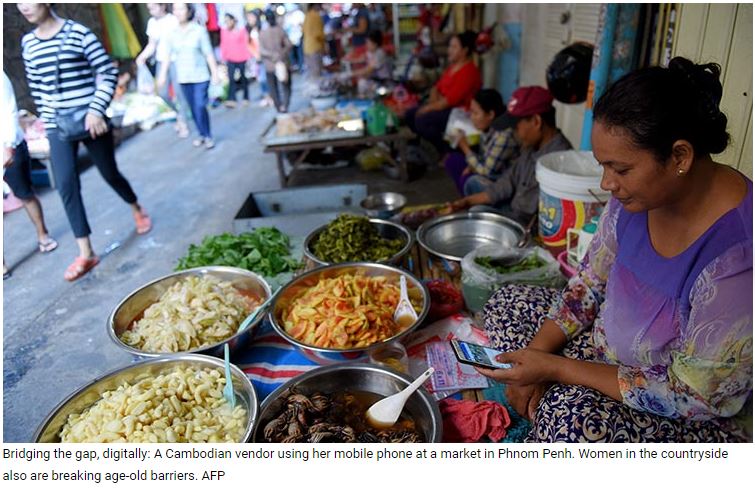Business bosses share insights on empowering Asia’s rural women entrepreneurs
Rural women need to build their confidence, as many don’t see themselves as entrepreneurs when they start their own businesses
Women business leaders in Asia say among the best ways to help rural women become entrepreneurs are the ability to listen and adapt to their needs and an awareness of the barriers they face in starting a venture and getting access to credit.
A webinar organised by the Economic Research Institute for ASEAN and East Asia (ERIA) and Indian incubator CIIO.CO heard from speakers in Cambodia, Indonesia and India. They shared their experiences starting their own businesses and helping women in the countryside turn their own ideas into reality by improving their financial literacy and tech knowhow, mentoring them, and getting them access to funding.
According to Lida Loem, Co-founder and Technical Advisor at SHE Investments, Cambodia, around 90 percent of the staff are Cambodian women. The company’s mission is to support 1,000 Cambodian businesswomen over five years. It has worked on more than 20 incubator and accelerator programmes and connected 15 businesses to finance of up to $10,000. Its long-term goal is to fund investments of as much as $100,000.
SHE Investments created a bookkeeping app called Kotra Riel to help women microentrepreneurs manage their businesses. Loem said it was important to give them the training and tools essential to make the most of it since most of the existing apps were overcomplicated written in English. SHE Investments achieved that by showing the prototype to rural women, getting their input and adapting the app to their abilities and needs.
“We acknowledge their experience. We acknowledge their backgrounds, their education, their community and adapt in the right way,” she said. “We need to find what is best for them and what they need to learn.”
Rural women also need to build their confidence, Loem said, as many don’t see themselves as entrepreneurs when they start their own businesses.
“When most women in rural areas or on low incomes start their business, they just say it’s an extra activity to support their family, they don’t see themselves as a business owner or entrepreneur,” she said. “SHE Investments tries to understand how we can support them to see themselves as business women and entrepreneurs. We believe mindset is the way, so in our training we focus on building core and creative thinking.”
Denica Riadini-Flesch, is the founder and Chief Executive Officer of SukkhaCitta, Indonesia, a clothing company that employs and trains rural women and helps them start their own businesses. It also focusses on environmentally-friendly practises, using natural dyes to cut pollution.
Riadini-Flesch is an economist who had no background in fashion but decided to make the move on discovering that 98 percent of women who make clothes don’t earn a living wage and work in unsanitary conditions, while 25 percent of pollution in Indonesia is caused by chemicals used in dying clothes.
Her business started five years ago with three women and now provides education and wages for 1,000 families in eight villages across the country, raising their income by an average 60 percent. Every purchase of a SukkhaCitta garment funds the company’s village programmes and craft schools.
“I believe the only way we can solve the issue of exploitation in the long term is through education,” she said. “It’s not just about providing work. It’s also about providing women with training so that they can value their own work. For us that is what true empowerment is.”
Social values are not the only barrier to rural women entrepreneurs, Riadini-Flesch said, explaining that opportunities are limited and unequal, women don’t have the same legal protection as men and lack the education opportunities of their male and urban peers.
SHE Investments believes in empowering local women to lift up the whole community with a focus on selecting a single outstanding entrepreneur to inspire others, Riadini-Flesch said.
“In every village, we select one local champion who gets access to microcredit and business training so that she can set up her own social enterprise. I feel that’s the only way we can change on a larger scale because by doing that we are literally pushing them out of the informal sector into the visible formal sector.”
Other speakers included India’s Ajaita Shah, Founder and CEO of Frontier Markets, India. She created an end-to-end digital platform for sales and delivery, discovering last-mile demand and designing appropriate services, employing local women microentrepreneurs.
Establishing a startup is difficult for women microentrepreneurs in rural India, she said, given the local market size and the red tape involved in getting access to traditional loans.
“Creating the board, creating the structure, registration, there’s a lot of issues. We believe that the opportunity of a women-owned collective that is structured as a private limited could be very powerful. It could be a startup but it’s an aggregated startup of microentrepreneurs and you are actually giving them the benefits of what a startup is,” she said. “Accountability and management still need to bring other professionals into that system to make it happen. It’s a co-owned model but you’re giving these women a true shareholding opportunity.”
Chetna Sinha set up the Mann Deshi Bank to provide a funding source for rural women microentrepreneurs and the Mann Deshi Foundation to improve financial literacy and give them business skills.
By providing loans to microentrepreneurs Mann Deshi Bank helps rural women grow their businesses, giving them access to credit from traditional banks, she said, since they have an established credit history.
Sinha said she believes rural women microentrepreneurs will change the gender balance in India where fewer than seven out of 100 entrepreneurs are women.
Source: https://www.khmertimeskh.com/501015936/business-bosses-share-insights-on-empowering-asias-rural-women-entrepreneurs/


 English
English




